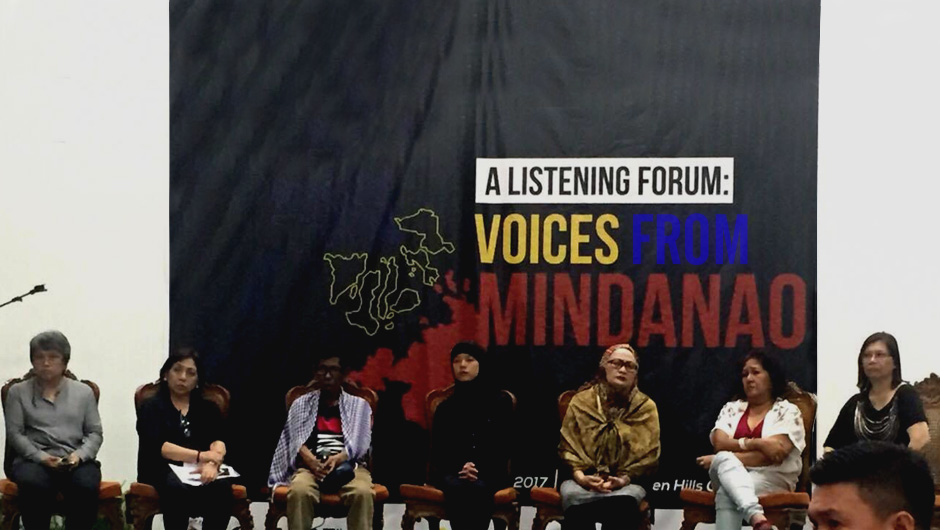Mindanao Spoke Up: Martial Law NOT a Solution in Marawi

On May 22, Marawi City became ground zero of Maute Group’s attack. As of 5 June, clashes are still ongoing, and death toll of soldiers and civilians is already at 188. Maute Group is an insurgent group of around 100 members said, to be linked to ISIS.
The conflict initiated efforts among civil society groups, political organizations, and foundations to convene and organize a series of “Defend Democracy Forums”, which was launched in La Salle Greenhills on 02 June. “A Listening Forum: Voices from Mindanao” gathered 200 leaders, representatives from the academe, media, and NGOs, to hear the voices of Maranaos as they narrated personal experiences during the attack. This was a platform to reach out to the public, in the hope of expanding conversations and deepening knowledge on the current events that has lead to the declaration of Martial Law in Mindanao.
Speakers during the first part of the program highlighted how solidarity between Muslims and non-Muslims was exemplified during the Marawi siege, contrary to what is being publicized that the terrorist group singled out the Christians. Cora Mangilen of the Christian Movement in Dialogue for Peace, a church group based in Marawi, said that religion cannot be the root of the conflict as Christians and Muslims coexist in the area peacefully. ”When people were evacuating the town, nobody was particular as to the religion of who was extending and receiving help,” recalled Mangilen. Mindanao State University (MSU) student Junaima Sharif, shared how her upbringing both at home and in school was about equal treatment, and respect to any religion.
The next discussions were focused on impressions of Mindanaoans on the declaration of Martial Law in the entire Mindanao after the government troops clashed with the terror groups in Marawi City. Mags Maglana of Konsyensya Dabaw and Patricia Sarenas of MINCODE cautioned that Martial Law does not offer a solution to the problem. “We are threatened by terrorism, and similarly dictatorship. We are concerned of the legal basis and the constitutionality of the declaration,” was the common sentiment of the panelists.
Institute for Leadership, Empowerment and Democracy (iLEAD) Executive Director Tanya Hamada articulated that Philippine democracy is facing challenging times ahead. “Institutions are unable to perform at the fullest capacity, and justice system with the administration has shown contempt for the democratic process and the rule of law,” said Hamada.
This discussion on Martial Law in Mindanao will culminate in a Defend Democracy Summit of 12 June 2017. It will be followed by a series of forums on democracy issues facing the country. Convenors for this event include Active Citizenship Foundation, Ateneo de Manila University (ADMU), Caucus of Development NGO Networks, and iLEAD.
The event was organized with the support of FNF, a German organization that promotes participatory democracy, human rights, and the rule of law.